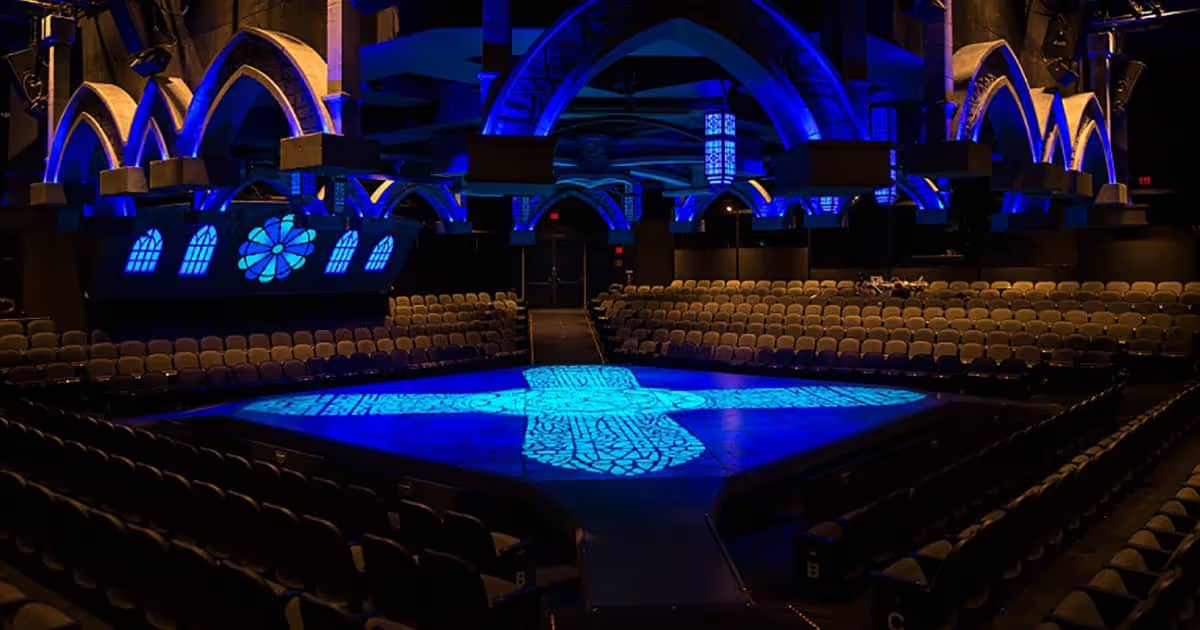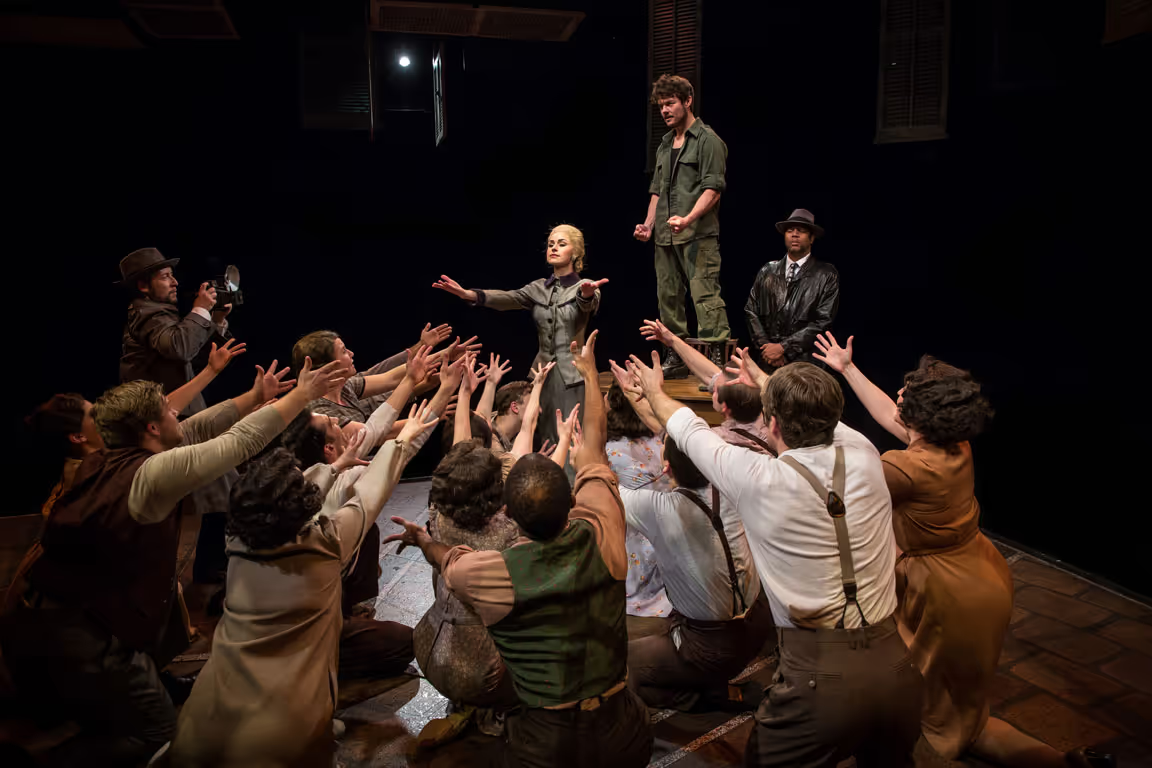'Evita' At the Marriott Theatre
In reviving “Evita, ” it’s essential that the musical be staged within the framework established by director Harold Prince in the original London production in 1978. The Prince concept drives the show. The Marriott Theatre is presenting “Evita” with Alex Sanchez as both director and choreographer. Sanchez retains Prince’s classic model but adds enough tweaks to burnish the Marriott version with fresh theatrical and dramatic impact.
“Evita,” as every musical lover knows, is the biography of Eva Peron, the power behind Argentine dictator Juan Peron during the 1940’s. We first meet her as the ragamuffin 15-year old Eva Duarte, living in obscurity and poverty in a backwater Argentine town. But Eva wants to become a star, and she has a plan, a plan built on sleeping her way to the top level of power in Buenos Aires. She eventually connects with General Juan Peron and orchestrates Peron’s ascent to his country’s presidency. It was then just a short and brutal step to dictatorship.
“Evita” started out as a record album in England with music by Andrew Lloyd Webber and lyrics by Tim Rice. Prince shaped the music into a remarkable stage vehicle, blending the score with choreography to trace Eva’s rise and fall. Prince created a narrator named Che to guide the audience through Eva’s career. Che and Eva and Juan are the only major continuing individual characters in the musical, complemented by a large chorus of singer/dancers representing the Argentine underclass who formed the backbone of Eva’s popularity.
The Sanchez production drains any sentimentality from the story. Eva is a hard-edged opportunist worshiped by the Argentine poor until she comes to believe in her own myth. The role makes huge vocal demands on the performer, so Hannah Corneau sings five of the week’s eight performances, replaced in the other three by Samantha Pauly. On opening night Corneau’s voice was loud and powerful but often shrill. Her voice may have been strained or perhaps she deliberately avoided “beautiful” singing to buttress her Evita as a lady on the make and not an opera diva. In any case, the strident effect worked to underscore the character’s ferocious ambition and ultimately her desperation.
Austin Lesch makes a particularly youthful Che, singing and acting the role with a cynicism that reinforces the calculating and manipulative drive of Eva’s rise to power. Viewers won’t find a heroine in Eva at the Marriott, yet a woman too complex to be a black and white villain. All the productions of “Evita” I’ve seen have portrayed this complexity in some manner, but Sanchez has give it his personal edge.
Larry Adams plays Juan Peron with a big voice and a strong outward presence. Juan is ready to abandon Argentina for a life of leisurely exile when the political going gets rough, but Eva is strong-minded enough to keep him in Buenos Aires and leadership over one of the most corrupt governments in Latin American history. Adams may have been attracted to Eva for erotic reasons, but in her final days he has the humanity to show, if not outright love, then admiration for his driven wife, along with dependency.
The only other characters who separate themselves from the ensemble are big-voiced David Schlumpf, Eva’s first lover during her ascent to power, and Eliza Palasz, Peron’s young mistress callously displaced by Eva. Palasz has only one song as the evicted mistress, a plaintive lament called “Another Suitcase in Another Hall,” and she nails it.
The large chorus comprises perhaps the most exciting character in the production, the impoverished men and women who fell under Eva’s spell and sobbed at her death, refusing to recognize her betrayal of their trust as she grew increasingly wealthy and powerful. Sanchez brilliantly choreographs the chorus, using them as an essential element in the narrative. Sanchez has also revised the staging in small ways. The competition among the generals for the political leadership of the country is usually portrayed by a game of musical chairs. Sanchez changes it to a series of brief wrestling matches. The musical chairs were amusing, but the wrestling reflects the underlying violence of the power struggle, a nasty contest of the survival of the fittest to control Argentina.
The production is a good fit for Marriott’s intimate in-the-round stage. There is little to Thomas M. Ryan’s set except open space, with different locations signified by shifting properties designed by Sally Weiss. The company employs the theater aisles as well as the stage, allowing the action to flow smoothly from short scene to short scene. Robert Gilmartin designed the sound, Jesse Klug the lighting, and Nancy Missimi the costumes.
The Marriott orchestra directed by Patti Garwood likewise is an integral character in delineating the play’s narrative and mood. The orchestra makes splendid use of Argentine tango rhythms, with fine guitar solos by Dave Saenger. There are only 10 musicians in the band but their sound filled the theater like a first-class Broadway pit orchestra.
“Evita” has always been one of my favorite musicals. The Harold Prince staging never fails to dazzle. He took what is basically a tawdry story of a tinhorn dictator and his round-heeled consort and turns it into a theatrical feast. The Lloyd Webber-Rice score is the best of their collaborations. The show is almost entirely sung through, highlighted by the signature song “Don’t Cry for Me, Argentina” and the even better, if less known, “High Flying, Adored.”
My only quibble is the excessive length of the second act, especially Evita’s drawn out decline leading to her death from cancer at the age of 33. Ten minutes could be blue penciled from Evita’s downward spiral with no loss. Sanchez omits the film projections that normally flavor the show visually, trusting the score, the original theatrical imagination of Harold Prince, and his own creativity to sustain the evening. His production is intelligent and revealing. He has earned an encore assignment.











